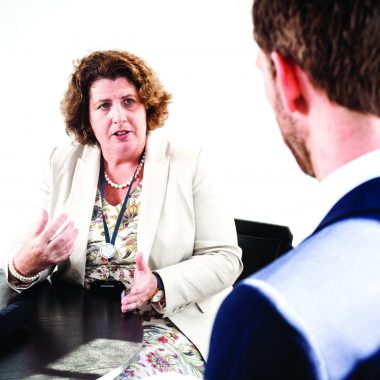You have to watch yourself with Dr Maureen Baker. She is completely capable of – very politely – sticking the knife in if you cross her.
I sit down with her in a blindingly white room at RCGP headquarters near Euston station. The August sun is blazing through the window and Dr Baker is busy raking her hands through her unruly hair. ‘I wish you had warned me there would be a camera,’ she says pointedly.
She is jovial until I dare to suggest the college may have not have been totally vindicated after the judicial review of the MRCGP exam earlier this year.
‘We did win. I must ask you, have you read the full judgment?’
I mumble a ‘Yes’, although in reality I have to admit I read a shortened version.
‘If you read the full judgment you would recall the judge’s opinion was that the exam is lawfully fair,’ she says, jabbing the table. ‘The fact that there are disparities in the outcome [between white and non-white candidates] is the culmination of a whole number of factors, but not discrimination.’
But didn’t the judge say that it was time to address the differences in pass rates for white and non-white candidates?
She shakes her head: ‘The fact that there are discrepancies in the exam outcome is a collective problem, and basically we have a part to play, as do others, in ensuring that candidates are properly supported and prepared for the exam.’
She adds: ‘[But] the judge did not say anything about making any changes to the examination. The examination is fair and non-discriminatory.’
She has made her point and it is characteristic of her style. No nonsense, forceful. You may not agree with what Dr Baker says, but she will make a powerful case.
When Dr Baker followed on from the charismatic chair Professor Clare Gerada, she was best known for fronting the college’s response to the swine flu pandemic in 2009. Many expected a less combative style, but she has shown her mettle since taking over in November.
Winning the seat
A long-time senior member of the RCGP – she was honorary secretary from 1999-2009 – Dr Baker’s election as chair last year was surprisingly tortured. She was announced as chair-elect after a ‘technical error’ with the application from the only person who stood against her, Dr Steve Mowle. This was then overturned ‘in the interests of democracy’ by RCGP Council. Dr Baker eventually won the subsequent ballot, but it was an inauspicious start to her time at the helm of the college.
Despite this, she has become an energetic chair – steering the college through a divisive High Court case over the MRCGP exam, launching an independent inquiry into ‘patient-centred’ care and continuing the college’s high-profile campaign for more resources for general practice.
She has carefully chosen her words for maximum effect to describe the crisis in general practice and ended up on the front pages of the national newspapers as a result.
She makes no apologies for using hyperbole, comparing herself to the BBC business editor Robert Peston before the financial crisis.
‘People said he’s talking up the problem and it’s making it worse. And actually, he wasn’t; it was dire, it was a crisis, it had to be addressed.’
She goes on: ‘I’ve said things like “teetering on the brink” or “on the verge of extinction” and these are strong, powerful statements. But then I have heard from colleagues that I am not being strong enough, that I’m not painting the picture as it actually is.
‘I do recognise that these are powerful statements and it does not paint a good picture of what’s going on in general practice, but I think we are holding up a mirror to general practice and showing things as they are.
‘I really do think that things will get better, but they will only get better if we collectively make them better. Just sitting on our hands waiting for things to get better is a recipe for disaster.’
But is it realistic to demand more resources for general practice with the current fiscal situation? ‘Well, what we are asking for is a rebalancing of resources, actually. If there was more money coming into the health service overall, great, but even so, we need to use our resource better.’
And once again, she is in full flow. ‘When you look at the demographics, when you look at multi-morbidity, when you look at where patient care is in the 21st century, you have to invest in GPs and their teams. We are not spending our NHS pounds as wisely as we could or should, and we really need to make this case.’
Now that she has made the case for change, Dr Baker says that the college will be moving onto the next phase of its ‘Putting Patients First’ campaign, which will suggest solutions to the current crisis. But she is realistic about what can be achieved 10 months before a general election.
She says: ‘There is not much time. It would be very good to see some actual steps to take to support general practice in the meantime.
‘We are working with all of the major parties. We are giving them the messages about the campaign. We are trying to set out again the potential of general practice, what we can do, and the fact that it makes good sense to have proper robust effective general practice, not just for general practice, but for the health of the wider NHS.’

Click here to see the full Power 50
Read a full interview with Dr Maureen Baker
I ask her to sketch out what this future of general practice might look like, and this is the first question where I am not altogether convinced by her answer.
She says: ‘I think practices that work collaboratively will be much better able to meet the challenge. There are a number of different models: there are federations of practices, there are large practices – there are a number of ways in which you can do it. But I feel that it’s likely that we need to share skills, share the expertise, share some back-office functions to get the most we can out of the resource we get.’
But whether this is enough to convince ministers to allocate more resources to general practice remains to be seen.
Looking ahead
Dr Baker clearly has a busy year ahead of her, with pilots planned of four-year GP training and chairing a review of the college’s practice in equality and diversity in the wake of the row over the MRCGP exam.
She says about the review: ‘This is across all areas of college activity – not just the exam – to find what best practice is and to see if we meet it and if there is anything we need to do. This is something personally I am very committed to, and I know my colleagues are. We feel we have the opportunity – especially having won the judicial review – to move on and do this piece of work.’
Dr Baker says her best moment over the past year was being presented with the chain of office by Professor Gerada. ‘It was a lovely gesture, a nice thing to do.’
And I get the sense by the end of the interview that, after nine months, she is beginning to settle into her role as chair and relish the power she has to speak her mind. But does she enjoy being the public face of GPs?
‘I wouldn’t say that I don’t enjoy it,’ she says with a twinkle in her blue eyes. ‘But it’s not something that I would seek out if it were not for this role.’
Related articles
RCGP launches inquiry into how GP role should change
Only two weeks to save general practice, warns RCGP
Dr Maureen Baker: ‘We agree that further action is necessary’
Pulse October survey
Take our July 2025 survey to potentially win £1.000 worth of tokens














